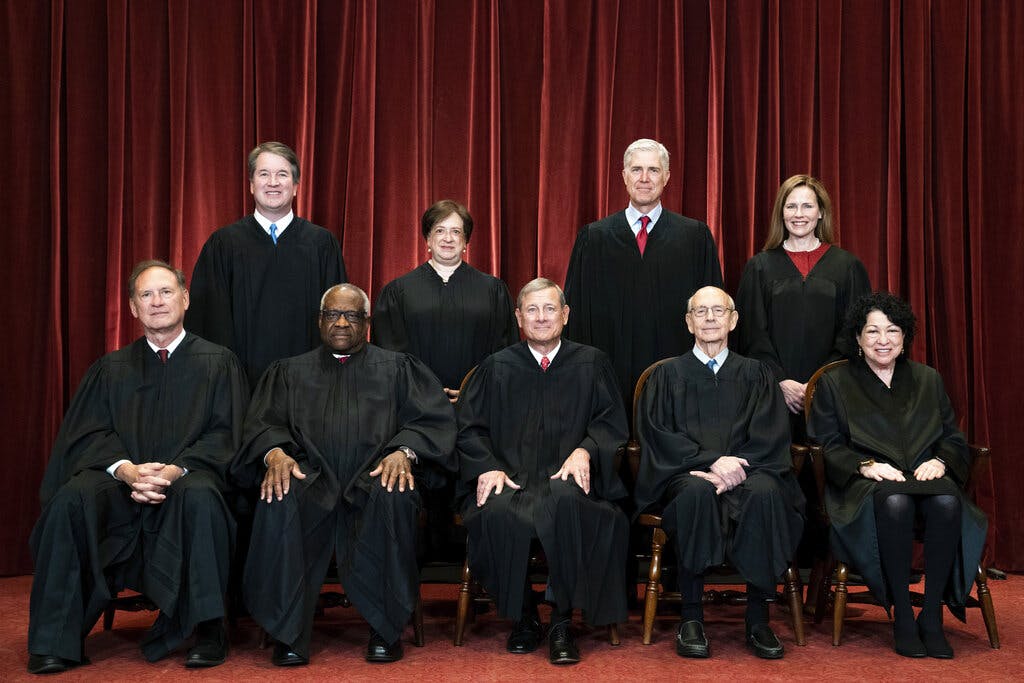Dobbs Could Be Just the Beginning as Supreme Court Set To Weigh Whether To Address Fetal Personhood
The Supreme Court is asked to decide whether to hear a case that is brought on behalf of two fetuses in utero at Rhode Island.

Just months after the Supreme Court concluded, in Dobbs v. Jackson Women’s Health, that the Constitution does not include the right to an abortion, it is set to weigh whether to hear a case that centers on the personhood of the unborn.
The issue looms as the next constitutional frontier in a debate that has raged since Roe v. Wade was decided a half century ago. A petition for certiorari has been filed in the case of Jane Doe, as Parent and Next Friend of Baby Mary Doe, et al., Petitioners v. Daniel McKee, Governor of Rhode Island, et al.
The petition asks the high court to consider whether the Rhode Island Supreme Court erred in holding that fetuses “are not entitled to the protections and guarantees of the due process and equal protection clauses of the United States Constitution.” For it to be heard, four justices need to signal interest.
Those protections and guarantees, found in the Constitution’s 14th Amendment, promise that no state shall “deprive any person of life, liberty, or property, without due process of law; nor deny to any person within its jurisdiction the equal protection of the laws.” The word “person,” however, is not defined in the parchment.
The case reaches the Supreme Court via unconventional petitioners: a pair of fetuses, arguing in utero for their constitutional rights, joined by their parents and the religious groups Catholics for Life and Servants of Christ for Life.
Baby Mary Doe is a 34-week-old fetus, and Baby Roe is 15 weeks. They lost at both Rhode Island’s superior and supreme courts in challenges to the Ocean State’s Reproductive Privacy Act. The latter body also declined to rehear the case, prompting the writ of certiorari.
Passed into law in 2019 to “codify the privacy rights guaranteed” by Roe, the RPA guarantees an abortion prior to Roe’s viability demaracation, and allows for post-viability abortion for the health or life of the mother.
It also repealed a state law on the books since 1861, which dictated that a “human life at the instant of conception is a person within the language and meaning of the fourteenth amendment of the constitution of the United States.”
The question is not an entirely novel one to the Supreme Court. In Roe, the majority held that the word “‘person,’ as used in the Fourteenth Amendment, does not include the unborn.” Dobbs, which called the earlier decision “egregiously wrong,” held back from ruling “when prenatal life is entitled to any rights enjoyed after birth.”
The court is now invited to bend to that task. Petitioners ask the court, which they note is “the final arbiter of what the Constitution means,” whether “unborn human beings, at any gestational age, have any rights.” Lower courts have answered in the negative, with the trial court holding that unborn persons “do not have rights as persons to make this challenge.”
Baby Mary Doe and Baby Roe reach back to Sir William Blackstone’s “Commentaries on the Laws of England,” from the 18th century, for the proposition that, “Natural persons are such as the God of nature formed us.” They argue that “‘human being,” used synonymously with “person,” was consistently and commonly understood to mean humans both born and unborn.
Another line of argument points out that the word “person,” since the days of Magna Carta, has been a term of “inclusion, not limitation.” In the 14th Amendment itself, the “Privileges and Immunities” clause applies only to “citizens,” while due process and equal protection are extended to the expansive category of “persons.”
Tracing a line of jurisprudence back to “Roman civil law,” the petitioners tell the court that the “legal rights of the unborn child are as old as the common law itself,” most notably in the domains of inheritance and property law, where unborn children possess the ability to “inherit all manner of estates,” as an English court put it in 1740.
Offering another lure to the court to take the case, the writ invokes the 10th Amendment, which reads “The powers not delegated to the United States by the Constitution, nor prohibited by it to the States, are reserved to the States respectively, or to the people.”
This amendment allows states to pass laws like the RPA as long as they do not conflict with the powers of the federal government. On that score, the petitioners argue that Rhode Island’s statute runs afoul of the 14th Amendment’s guarantee that no ordinance shall deprive “any person” of the “right to life” without the “due process of law.” That would render the RPA unconstitutional.
The Supreme Court is hardly the only front in this emerging contest to define the status of the unborn in the wake of Dobbs. In Georgia, a law that took effect as soon as Roe fell mandates that a fetus qualifies for tax credits and child support. It is also to be considered in population counts and redistricting calculations.
Some in the Peachtree State are pushing even further, to amend the state constitution to enshrine fetal personhood, which would make abortion tantamount to murder.
In a tweet announcing the filing of its petition to the Supreme Court, Servants of Christ for Life wrote, “Our Lady of the Unborn, pray for victory.” Rhode Island’s reply is due October 6.

